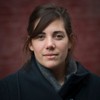A green SUV with the red, black, and green flags of the African nation suction cupped to its back windows is parked at the curb, bearing stickers shouting FREE THE MOVE 9 and STOP MURDER BY POLICE. I've seen this car all over Philadelphia, chugging reliably near the end of every Black Lives Matter protest, always ready to offer a bottle of water or a ride to someone on crutches. Now it stands like a sentry welcoming us to the first ever MOVE conference, held in the first week of May. The idea is simple: to hear about one of the most notorious incidents in Philly history directly from the horse's mouth, the people of MOVE themselves.
Ramona Africa, the conference's main organizer, is greeting attendees. She was a college student at Temple University about to head off to study law when she went to a meeting about a group called MOVE in 1979. "You want to be a lawyer?" one of the members asked her. "Well, you should go and sit in on the trials of our family."
Advertisement
In 1978, the Philadelphia Police Department raided MOVE's home, resulting in the death of Officer James Ramp. Nine MOVE members were put on trial for his murder, and each sentenced to 30 to 100 years in prison.Ramona went to the trial. "For the first time, I saw the American legal system clearly," she says. "Their trials showed me that if you believe in the legal system and think it has justice to give, you're being bamboozled." Two of the nine have died in prison; seven remain incarcerated.
Ramona joined MOVE after it relocated to a new house, a row home several miles west in a middle-class black neighborhood of West Philadelphia. There, MOVE loudly demanded the release of its members and an end to police brutality against people of color across the city, which, under Mayor Frank Rizzo, was blatant. The neighbors complained, and there were rumors of the group getting more militant, so the PPD began to arrest them for minor infractions in an attempt to disband the house. On May 13, 1985, under the direction of Mayor Wilson Goode, a police helicopter dropped a bomb on the roof of the MOVE row home.Eleven members of MOVE, including five children, were killed. The house exploded in flames."There was a conscious decision to let the fire burn," says Goode at an independent commission hearing formed to investigate the events. An entire city block, including 61 homes belonging to black citizens unaffiliated with MOVE, burned. Ramona and a young boy were the only survivors among group members present that day. Later he died too, making Ramona the only original MOVE member at the bombed home still breathing.
But there were more members who didn't live in the bombed house, plus a fresh infusion of members who joined up after the tragedy. Most people think that the story of MOVE ended with that explosion, but that's not the case. These days, the MOVE family consists of about 50 people living in five row-homes scattered around West Philadelphia and perhaps 50 more living in the suburbs and New Jersey (members decline to give exact numbers or addresses for fear of police harassment).
They also have supporters around the world, many of whom travel to attend the three-day conference this month. A white-haired couple leaned close together, speaking German; I could hear French too. Other attendees had come from Belgium, Texas, Georgia, Indiana, and New York City. The hallways smelled of patchouli and essential oils. Vendors unpacked dresses in colorful African-inspired prints, as well as volumes on Palestine, Mumia Abu-Jamal, and Malcolm X.
Members of MOVE today still follow most of the guidelines laid down by the group's founder, John Africa, who died in the bombing. Besides taking Africa as a surname, they protect and feed animals, compost and grow their own food as much as possible, and homeschool their children. They also hold family meetings about once a week.
